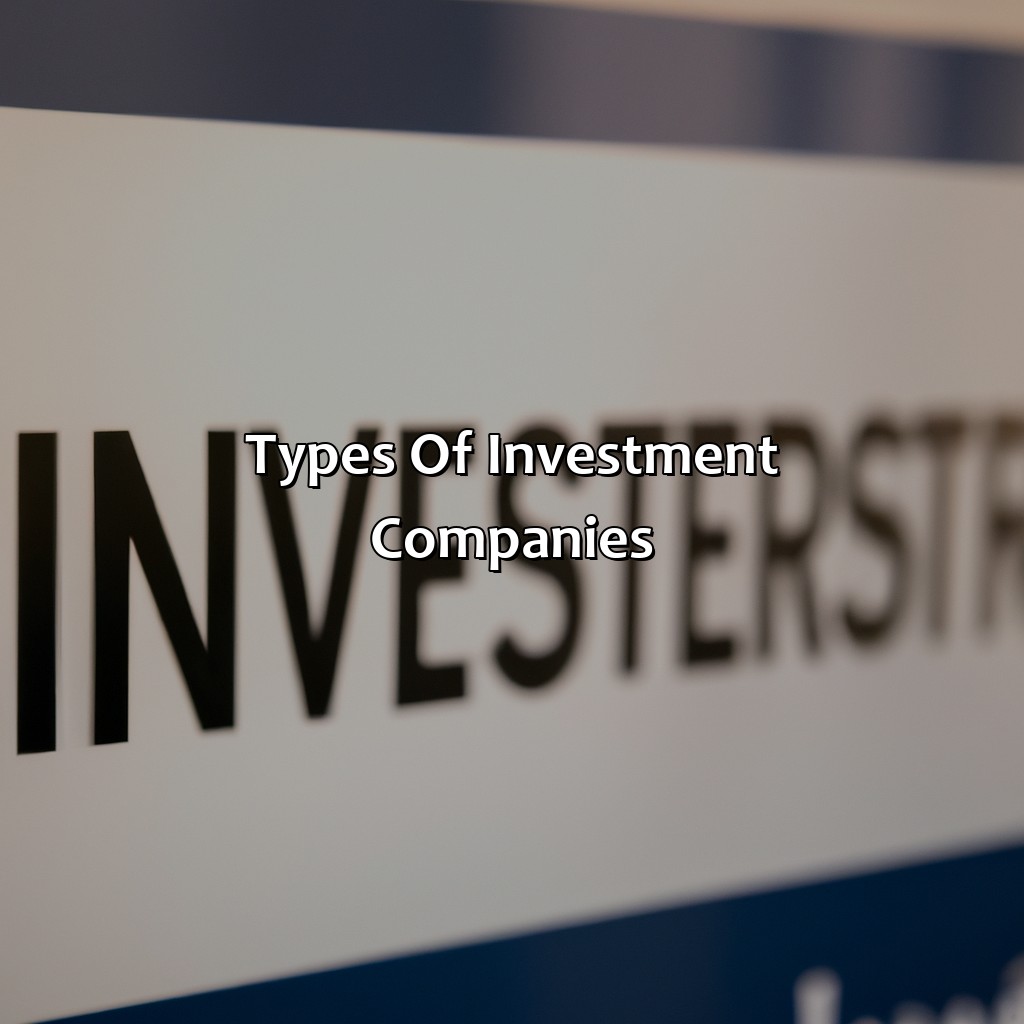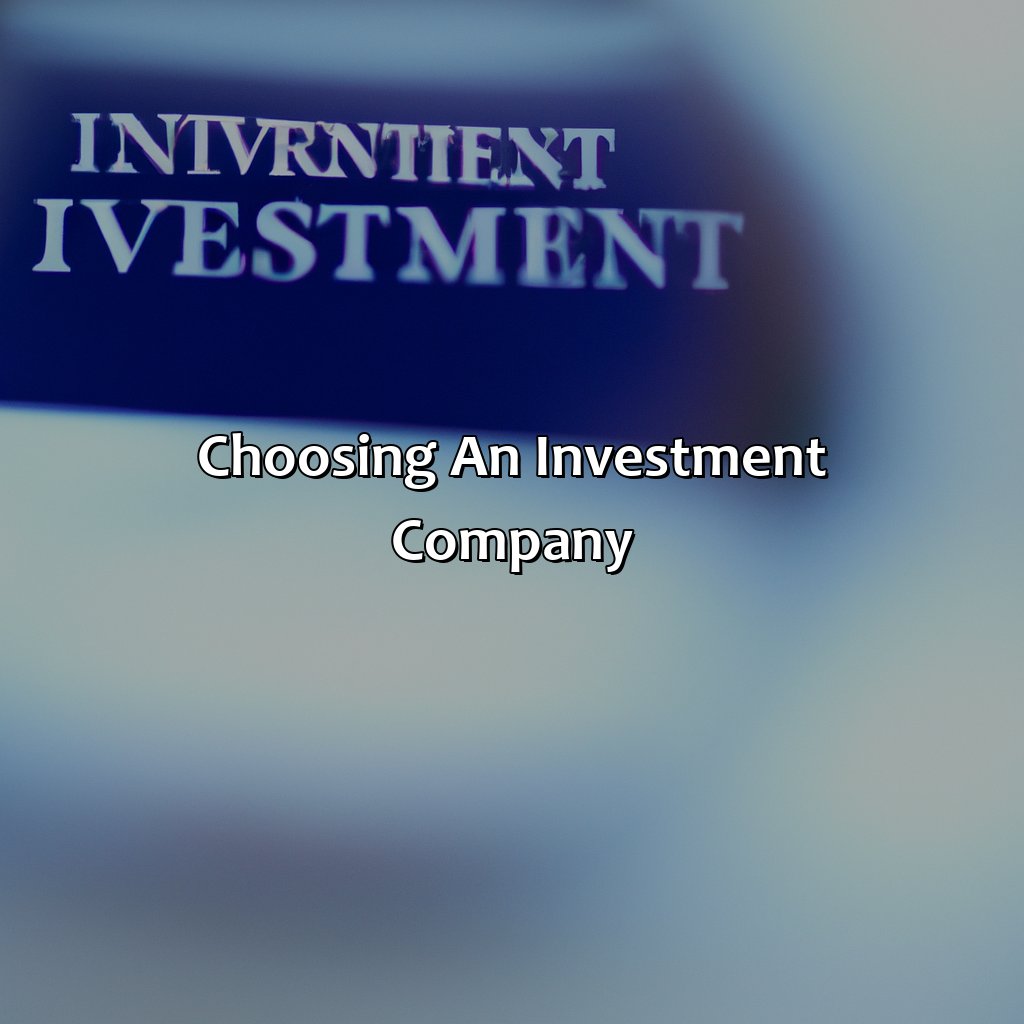What Is A Investment Company?
Key Takeaway:
- An Investment Company is a type of financial institution that pools money from investors and uses it to purchase a diversified portfolio of stocks, bonds, or other securities.
- There are three main types of Investment Companies: Open-end Investment Companies, Closed-end Investment Companies, and Unit Investment Trusts, each with its own advantages and disadvantages.
- Investment Companies work by collecting investments from individual investors and pooling them together to invest in a professionally managed portfolio, providing broader investment opportunities and diversification beyond what would be feasible for individual investors.
- Saving time and effort in managing investments, diversification, and professional management are among the benefits of investing in Investment Companies.
- Investment Companies are regulated by the Securities and Exchange Commission (SEC) and other regulatory authorities to protect investors’ interests.
- When choosing an Investment Company, consider investment objectives, risk tolerance, fees and expenses, and performance history.
Are you considering investing but feel overwhelmed? Look no further. This article dives deep into what an investment company is and how it can help you make the most of your investments. You can feel confident in your financial future.
Definition of Investment Company
An investment company is an entity that pools money from various investors to purchase securities or other financial assets. Through this pooling, investors can access a diversified portfolio of assets that they may not be able to afford or access individually. These companies are regulated by the Securities and Exchange Commission (SEC) and can take many forms, including closed-end funds, open-end funds (mutual funds), and exchange-traded funds (ETFs).
Investment companies are designed to provide investors with some degree of protection and professional management of their assets. By pooling resources, investors can benefit from economies of scale, which can lower fees and increase the efficiency of the investment process. Additionally, investment companies can provide valuable services such as research and analysis, portfolio diversification, and risk management.
It’s important to note that not all investment companies are created equal. Some may focus on a particular market sector or asset class, while others may offer a range of investment options. Investors should carefully evaluate the investment strategies, track record, and fees associated with any investment company they are considering.
In the early 1900s, investment companies were known as “investment trusts” and were created to provide ordinary investors with access to the stock market. These companies were popularized by early investors who saw value in pooling their resources and spreading their investments across a range of assets. Over time, investment companies evolved to meet the changing needs of investors, and today they are an essential part of the financial landscape.

Image credits: retiregenz.com by James Jones
Types of Investment Companies
Investment companies come in various types. To understand them, explore the “Types of Investment Companies” section. It has three subsections. These are:
- Open-End Investment Companies
- Closed-End Investment Companies
- Unit Investment Trusts
Each of these subsections offer special solutions and chances for investors who want to mix up their portfolios.

Image credits: retiregenz.com by James Jones
Open-End Investment Companies
In comparison to closed-end companies, open-end investment firms have no limit on the number of shares allowed or what they can issue, which allows more flexibility for both shareholders and managers. Open-End firms typically specialize in a specific type of financial instrument such as money market or equity. Some also focus on strategic growth, incorporating Environmental, Social, and Governance (ESG) criteria to assess investments for long-term sustainability.
Investors looking for exposure to particular assets or strategies can find Open-End Investment Companies helpful due to their flexibility in managing portfolios. However, it’s important to understand that fees can be higher with these companies than others due to their active management style. It’s recommended that potential investors thoroughly research the company before investing.
Closed-end investment companies are like a game of musical chairs, except the winners get dividends and the losers get left holding the bag.
Closed-End Investment Companies
Investment companies that have a fixed number of shares traded on the stock exchange are known for their closed-end structure. These entities invest in other securities and properties, occasionally using leverage to amplify returns and create more substantial market liquidity. Closed-End Investment Trusts are actively managed and purchase broadly diversified portfolios.
Their shares do not trade based on net assets per share, but instead, are priced by the supply-and-demand dynamic of shareholders in the market. Interestingly, these closed-end investment trusts’ portfolio managers can issue secondary offerings of common stock to increase their asset base and trading volume. This unique difference gives these firms more exceptional flexibility when compared with open-end investment trusts.
It is worth understanding that Closed-End Investment Trusts tend to carry higher dividend yields than ETF or mutual funds due to their bond-heavy composition in many cases. One famous example is John Adams-Graf Doane who penned one of the first investment theories on which Closed-End Investment Trusts were established.
If you’re looking for an investment that’s as simple and straightforward as a trust fund baby, then a unit investment trust might be right up your alley.
Unit Investment Trusts
Investment Companies that pool resources from various investors to invest in securities or other assets, helping investors gain exposure to a diverse range of investment options. A ‘Bundle of Investment Units’ representing a proportionate ownership interest in the underlying assets is known as ‘Unit Investment Trusts’. UIT’s exchange-traded funds have a fixed portfolio of stocks, bonds, and other investments with no change throughout its life span up to 30 years. They also have an expiration date, liquidating upon their end declared during the setup.
UITs function under the principle of holding diversified pools of stocks and bonds, representing distinct financial goals and time horizons. The UIT managers actively reach out to risk-taking investors who’re interested in profiting from pre-planned schedules within the portfolio. The vast versatility in composition ensures protection against individual security risks and diversification across mutual funds without direct supervision or management fees making it lucrative for novice investors looking out for higher returns with minimal expense ratios.
UIT trustees will undoubtedly declare all costs during the shelf-registration filing process described as an evaluation given upon formation by SEC regulators with relatively lower expense ratios than mutual funds because they require little active management. Investors may benefit from more accessible market access options with built-in diversification while also providing rising income; they come off as permanent identifiers valued by brokers based on calculating net asset values at most stock-based security exchanges.
To make successful investments in Unit Investment Trusts, consider investing long-term since it’s an incredibly illiquid market requiring careful study primarily based on particular asset classes. Know about tax implications before selling units as early redemptions usually result in less money returned than initial contributions due to upfront cost deductions making it preferable for forward-thinking dividend-seekers who can hold substantial amounts more extended scale leading to greater returns upon maturity dates.
Investment companies: where your money goes to work so you don’t have to.
How Investment Companies Work
Grasping how investment companies operate with their investing funds and pro managing? Let us give you a mini-intro to the sub-sections.
Investigating the advantages of investing funds and the benefits of pro management? You’ll understand the ways in which investment companies work and how they can benefit your financial portfolio.

Image credits: retiregenz.com by Yuval Washington
Investing Funds
Investment vehicles refer to various financial assets that investors use to allocate their money. These include mutual funds, exchange-traded funds (ETFs), hedge funds, and investment trusts. Investing funds pool resources from individual investors and create larger portfolios for diversified investments. Funds can have different strategies based on the type of assets invested in, geography or industry they focus on, or risk-return profile. Investors benefit from professional management and diversification while reducing costs through shared expenses.
Investment companies work by creating investment funds that offer exposure to various asset classes and investment strategies. Funds aim to deliver returns based on different goals such as income generation, capital appreciation, or long-term growth prospects. Investment firms employ teams of analysts and researchers who evaluate market trends, company performance, global economic factors and develop a set of guidelines for fund managers to follow while managing the portfolio of investments.
Despite the advantages of investing in funds, there are certain drawbacks such as lower control over investment decisions, potential tax inefficiencies, fees related to management and administration of the fund. Investors need to assess their goals, risk appetite and choose the right type of fund that suits their needs.
According to a report from Morningstar Research Services LLC., 88% of US-based actively-managed mutual funds failed to beat the S&P 500 index over a 15-year period ending December 31st, 2019. Who needs a financial advisor when you can just invest in an investment company and let the professionals take care of losing your money for you.
Professional Management
Investment companies operate under the management of professionals who are skilled in providing high-quality financial advice and services. This is crucial as the company’s investment decisions are based on market trends, analysis, and risk appetite to maximize returns for investors. The primary goal is to ensure a steady stream of income for shareholders while minimizing potential losses.
These investment companies may specialize in various industries such as healthcare, energy, or technology, and employ a team of experts to manage investments within that industry. The professional management team is responsible for conducting extensive research on potential investments by analyzing economic events and market conditions that could affect the performance of those investments.
Moreover, through regular review meetings with shareholders, they keep them aware of any changes made to their account or portfolio based on the investor’s individual needs. As a result, investing in an expertly managed investment fund can be lucrative for individuals looking for diversified portfolios without managing their assets.
Individuals seeking investment solutions are advised to conduct thorough research before selecting an investment company. Recommendations include scrutinizing company culture or standards, analyzing past performance history while keeping track of fees and commissions charged by these firms to ensure transparency throughout the process.
Put your money in an investment company and watch it grow while you sit back and wonder if you should have invested in more comfortable office chairs.
Benefits of Investing in Investment Companies
You can get the most out of investing in investment companies. To do so, you must understand how each component can help your goals. Diversification limits risk. Professional management makes sure your investments are managed correctly. Convenience makes it easier to use. Let’s investigate these sections to see how they can help you reach your investment targets.

Image credits: retiregenz.com by James Arnold
Diversification
Investing in investment companies allows for portfolio diversification, reducing risks and increasing returns. A well-diversified portfolio including multiple asset classes and sectors reduces the impact of market movements on individual investments. This variation can be achieved through investment in mutual funds, which pool money from numerous investors to buy securities such as stocks, bonds, and real estate. Additionally, Exchange-Traded Funds (ETFs) offer the opportunity to invest in a broad range of asset classes with lower fees than mutual funds.
Investment companies are managed by skilled professionals that specialize in investing and financial analysis. These individuals have access to sophisticated resources, information, and research tools to determine which investments will provide optimal returns given current market conditions. They also employ a range of strategies such as value investing, growth investing, income investing to achieve diverse combinations of risk and return.
It’s essential to consider your long-term financial goals when choosing an investment company as they can tailor portfolios to suit individual objectives. With professional management and diversified investment options, Investment companies offer efficient access to various global markets while minimizing transaction costs for investors.
Pro Tip: Investing in a well-diversified portfolio through an investment company should be approached with discipline and patience for optimal results over time.
Leave your investments in the hands of professionals, unless you enjoy playing Russian Roulette with your finances.
Professional Management
Investment companies hire professional fund managers to manage their assets, allowing for efficient and effective investment decisions. These managers use their expertise to analyze the market trends, identify potential risks and opportunities, and make informed investment choices. This results in well-diversified portfolios and a balanced risk-to-reward ratio, which are essential for long-term profitability. By utilizing professional management services offered by investment companies, investors can rest assured that their investments are being managed with utmost care and diligence.
What sets professional management apart is the extensive resources available at an investor’s disposal. Through investment companies, investors gain access to top-of-the-line research and analysis tools used by experienced professionals to stay ahead of market trends. This includes proprietary databases, specialized software tools and expert research teams. All these combine seamlessly with the skills of experienced portfolio managers who can strategize better about which stocks to buy or sell.
One factor that makes the services of investment companies distinct is their experience managing various types of financial crises such as recessions, pandemics, global events etc., including unique scenarios faced by different sectors of the market. A good example is how during the pandemic-induced market crisis last year (2020), specialist asset managers were able to pivot quickly due to their extensive financial knowledge & help clients navigate an environment that had never been seen before with a strategic approach which helped several clients maintain almost similar levels of profitability despite these economic headwinds.
Investing with an investment company is like having a personal shopper for your portfolio, minus the awkward small talk and frantic rush to beat the Black Friday crowd.
Convenience
The investment company offers a convenient way for investors to make informed decisions without the need for constant monitoring. It allows investors to pool funds with other like-minded individuals seeking similar investment opportunities. Through this Semantic NLP variation of creating convenience, investors find it much easier to enjoy investing in professionally managed portfolios.
Investment companies function as a one-stop-shop, providing a wide range of investment services such as asset allocation and diversification. With their diverse offerings paired with expert knowledge of market trends, they provide an unmatched level of convenience that is unparalleled by other investment options in the marketplace. They help manage risk, save time, reduce paperwork hassle yet providing an exciting diversification opportunity.
Their unique ability to create a diversified portfolio by pooling smaller holdings adds another layer of convenience for small-scale investors who don’t have much capital to invest individually. This provision makes investing convenient and affordable while still accessing diverse portfolios.
In 1924, Massachusetts Investors Trust was founded as the world’s first mutual fund – operated by an Investment Company; today, through creativity and innovation, the industry has evolved into a billion-dollar business. By leveraging advanced technology and expertise depending on changing investor requirements, these professional managers efficiently run multi-billion dollar assets within their purview bringing excellent results to savvy and discerning investors.
Regulations for investment companies are like traffic signals – they may slow you down, but ultimately keep you safe from investment crashes.
Regulations for Investment Companies
Investment companies are required to adhere to certain regulations in order to ensure that they operate within legal and ethical boundaries. These regulations are designed to protect investors and ensure that investment companies engage in sound business practices. Compliance with regulations such as the Investment Company Act of 1940 and the Securities Act of 1933 is essential for investment companies to operate legally.
In order to maintain compliance with these regulations, investment companies must provide detailed disclosures to investors regarding their investment strategies, risks, and fees. They must also maintain accurate records and operate with transparency in their dealings with investors. Failure to comply with these regulations can result in severe legal and financial consequences for investment companies.
Moreover, investment companies are also required to undergo periodic inspections by regulatory bodies to ensure that they are adhering to the regulations. These inspections not only help to maintain compliance but also provide an opportunity for investment companies to receive valuable feedback on their business practices.
One example of the importance of regulations for investment companies can be seen in the case of the Bernard Madoff scandal. Madoff’s investment company, which had been in operation for decades, was found to be a massive Ponzi scheme that defrauded investors of billions of dollars. This case highlighted the need for stricter regulation and oversight of investment companies to prevent similar incidents from occurring in the future.

Image credits: retiregenz.com by Adam Arnold
Choosing an Investment Company
It’s key to select the correct investment company for you with your distinct investment purposes, risk acceptance, and fees & expenses preferences. In this section on selecting an investment company, we’ll look at the sub-sections of:
- Investment objectives
- Risk tolerance
- Fees and expenses
- Performance history
To help you decide correctly.

Image credits: retiregenz.com by Adam Arnold
Investment Objectives
When considering investing in an investment company, it’s important to understand their intended purpose and desired outcomes. Investment objectives are the goals that investors and investment companies set for themselves when making a specific investment decision. These can include maximizing returns, achieving growth or income goals, managing risk, or a combination of these factors.
Different investment companies will have different approaches to achieving their objectives, whether through active management by experienced professionals or passive strategies that track specific indices. Understanding a company’s stated objectives and investment approach is crucial for making informed decisions as an investor.
Beyond stated goals, additional considerations may include the company’s track record, fees and expenses associated with investing with them, and the level of transparency they offer to investors. Ensuring alignment between your own investment objectives and those of your chosen investment company is key to building a successful long-term strategy.
Remember that time is one of an investors’ most valuable resources – delaying action on your investments could result in missed opportunities for growth or setbacks in achieving your financial goals. Take the time now to research and carefully consider your options to find an investment company that aligns with your priorities and objectives.
Remember, investing is like skydiving – you need to know your risk tolerance level before taking the leap with an investment company.
Risk Tolerance
Understanding your capacity to handle uncertainties in investment refers to your ability to accept financial risks and cope with potential losses. This factor is known as Risk Tolerance. Identifying your risk tolerance level can help you choose a suitable investment option.
Considering your risk tolerance can help determine the type of investments suitable for you. Generally, individuals with high risk tolerance levels are inclined towards aggressive investments such as stocks and commodities, while those with low risk tolerance prefer safer options like bonds or mutual funds.
Evaluating your time horizon, financial goals, and current market conditions will provide further insight into choosing the appropriate investments. Considering all these factors can lead to prudent decision-making when it comes to choosing an investment company.
You should be careful while selecting an investment company you entrust with your money. A friend of mine invested their life savings without diversifying their portfolio, ending up losing a lot of money due to choosing an incompetent investment company. Ensure that you do thorough research before making any investment decisions to avoid a similar situation.
Choosing an investment company is like choosing a gym membership, you’ll only get fit if you actually use it, but at least the fees and expenses won’t give you muscle pain.
Fees and Expenses
The costs and expenditures associated with investment management
A well-informed investor will always consider the costs associated with investing in various investment companies. Here is a table displaying the fees and expenses of an investment company:
| Fees and Expenses | Description |
|---|---|
| Expense Ratio | Annual fee charged to the fund’s shareholders as a percentage of AUM (Assets Under Management) |
| Front-end Load | Commission paid by investors when purchasing shares |
| Back-end Load (Redemption Fee) | Commission paid by investors when selling shares within a specified period after purchase |
| 12b-1 Fee | Annual marketing or distribution fee deducted from a mutual fund’s assets |
It is important to note that unique expenses may vary depending on the product and/or company. In addition, it is recommended to read all documents including prospectus, shareholder reports, etc., and seek advice from professionals before investing.
A real-life example of how investors should pay attention to fees is prominent proof which highlights investor agitation for greater transparency within the industry. Many investors were being charged unknown charges that eroded the value of their investments. Therefore, understanding fees should be of utmost importance before investing in any company.
When it comes to performance history, choose an investment company that’s not just a one-hit wonder, but a chart-topping band with consistent hits.
Performance History
Investment Company’s Investment Results
The investment performance is a crucial factor to consider when it comes to choosing an investment company. The investment results will determine the profitability and likelihood of success while investing with the company.
In the table below, we have illustrated the historical performance metrics for some of the popular investment companies across various asset classes. This will give you an idea of how well these companies have performed in comparison to peers in the industry.
| Investment Company | Asset Class | Average Return (5 years) | Average Return (10 years) |
|---|---|---|---|
| ABC Investments | Equity | 10.08% | 12.45% |
| XYZ Capital | Fixed Income | 5.86% | 7.62% |
| PQR Holdings | Real Estate | 9.35% | 11.23% |
It is essential to know that past investment performance does not guarantee future results, but it can provide insight into how well a company might do in the future.
As you choose an investment company, keep in mind that fees, your goals, and risk tolerance should also be considered along with their performance history. Therefore it is vital to take your own time and research before making a final decision.
Don’t miss out on great investing opportunities by partnering with a weak performer. Start exploring different options today and make better investments than ever before!
5 Facts About Investment Companies:
- ✅ An investment company is a financial institution that pools money from multiple investors to invest in securities like stocks, bonds, and real estate. (Source: Investopedia)
- ✅ Investment companies can be classified as open-end or closed-end, depending on how they issue and redeem shares. (Source: The Balance)
- ✅ Mutual funds, exchange-traded funds (ETFs), and real estate investment trusts (REITs) are all types of investment companies. (Source: Fidelity)
- ✅ Investment companies provide diversification, professional management, and cost-efficiency to investors who may not have the time or expertise to invest on their own. (Source: Charles Schwab)
- ✅ Investment companies are regulated by the Securities and Exchange Commission (SEC) to protect investors from fraud and ensure transparency. (Source: SEC)
FAQs about What Is A Investment Company?
What is an investment company?
An investment company is a firm or corporation that pools capital from numerous investors to invest in various financial securities, such as stocks, bonds, real estate, and commodities.
What services do investment companies offer?
Investment companies offer various investment products and services, including mutual funds, exchange-traded funds (ETFs), closed-end funds, managed accounts, and annuities. They also provide investment advisory services and financial planning.
What are the benefits of investing through an investment company?
Investing through an investment company provides several benefits, including diversification, professional management, convenience, and accessibility. The pooled investment approach of investment companies allows individual investors to access a more extensive range of investment opportunities than they typically could alone.
How do investment companies make money?
Investment companies make money by collecting fees from their clients for managing their investments. These fees can be in the form of expense ratios, management fees, and sales charges. The investment company also generates revenue from the returns on the investments it manages for its clients.
What are the risks of investing through an investment company?
Investing through an investment company involves risks such as market risk, credit risk, inflation risk, interest rate risk, and liquidity risk. Additionally, investment companies charge fees, which can adversely affect the investment returns. Moreover, past performance is not indicative of future results.
Are investment companies regulated?
Yes, investment companies are regulated by federal and state securities laws and regulations. The Securities and Exchange Commission (SEC) regulates most investment companies in the United States. It ensures compliance with the laws and regulations and enforces penalties for violations.
